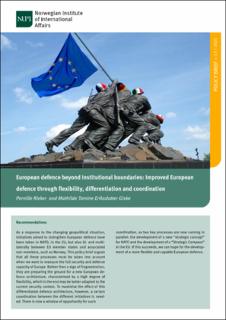| dc.contributor.author | Rieker, Pernille | |
| dc.contributor.author | Giske, Mathilde E. | |
| dc.date.accessioned | 2022-06-24T11:21:10Z | |
| dc.date.available | 2022-06-24T11:21:10Z | |
| dc.date.created | 2021-12-22T10:48:14Z | |
| dc.date.issued | 2021 | |
| dc.identifier.citation | NUPI Policy Brief. 2021, (13), 1-4. | en_US |
| dc.identifier.uri | https://hdl.handle.net/11250/3000580 | |
| dc.description.abstract | As a response to the changing geopolitical situation, initiatives aimed to strengthen European defence have been taken in NATO, in the EU, but also bi- and multilaterally between EU member states and associated non-members, such as Norway. This policy brief argues that all these processes must be taken into account when we want to measure the full security and defence capacity of Europe. Rather than a sign of fragmentation, they are preparing the ground for a new European defence architecture, characterised by a high degree of flexibility, which in the end may be better adapted to the current security context. To maximalise the effect of this differentiated defence architecture, however, a certain coordination between the different initiatives is needed. There is now a window of opportunity for such coordination, as two key processes are now running in parallel: the development of a new “strategic concept” for NATO and the development of a “Strategic Compass” in the EU. If this succeeds, we can hope for the development of a more flexible and capable European defence. | |
| dc.language.iso | eng | en_US |
| dc.relation.ispartofseries | NUPI Policy Brief;2021-13 | |
| dc.relation.uri | As a response to the changing geopolitical situation, initiatives aimed to strengthen European defence have been taken in NATO, in the EU, but also bi- and multilaterally between EU member states and | |
| dc.rights | Navngivelse-Ikkekommersiell-DelPåSammeVilkår 4.0 Internasjonal | * |
| dc.rights.uri | http://creativecommons.org/licenses/by-nc-sa/4.0/deed.no | * |
| dc.subject | Forsvar | |
| dc.subject | Defence | |
| dc.subject | Sikkerhetspolitikk | |
| dc.subject | Security policies | |
| dc.subject | Europa | |
| dc.subject | Europe | |
| dc.subject | Den europeiske Unionen | |
| dc.subject | The European Union | |
| dc.title | European defence beyond institutional boundaries: Improved European defence through flexibility, differentiation and coordination | en_US |
| dc.type | Report | en_US |
| dc.description.version | publishedVersion | |
| dc.subject.nsi | VDP::Internasjonal politikk: 243 | |
| dc.subject.nsi | VDP::International politics: 243 | |
| dc.source.pagenumber | 1-4 | en_US |
| dc.source.journal | NUPI Policy Brief | en_US |
| dc.source.issue | 13 | en_US |
| dc.identifier.cristin | 1971373 | |
| dc.relation.project | Norges forskningsråd: 287131 | |
| cristin.ispublished | true | |
| cristin.fulltext | original | |

